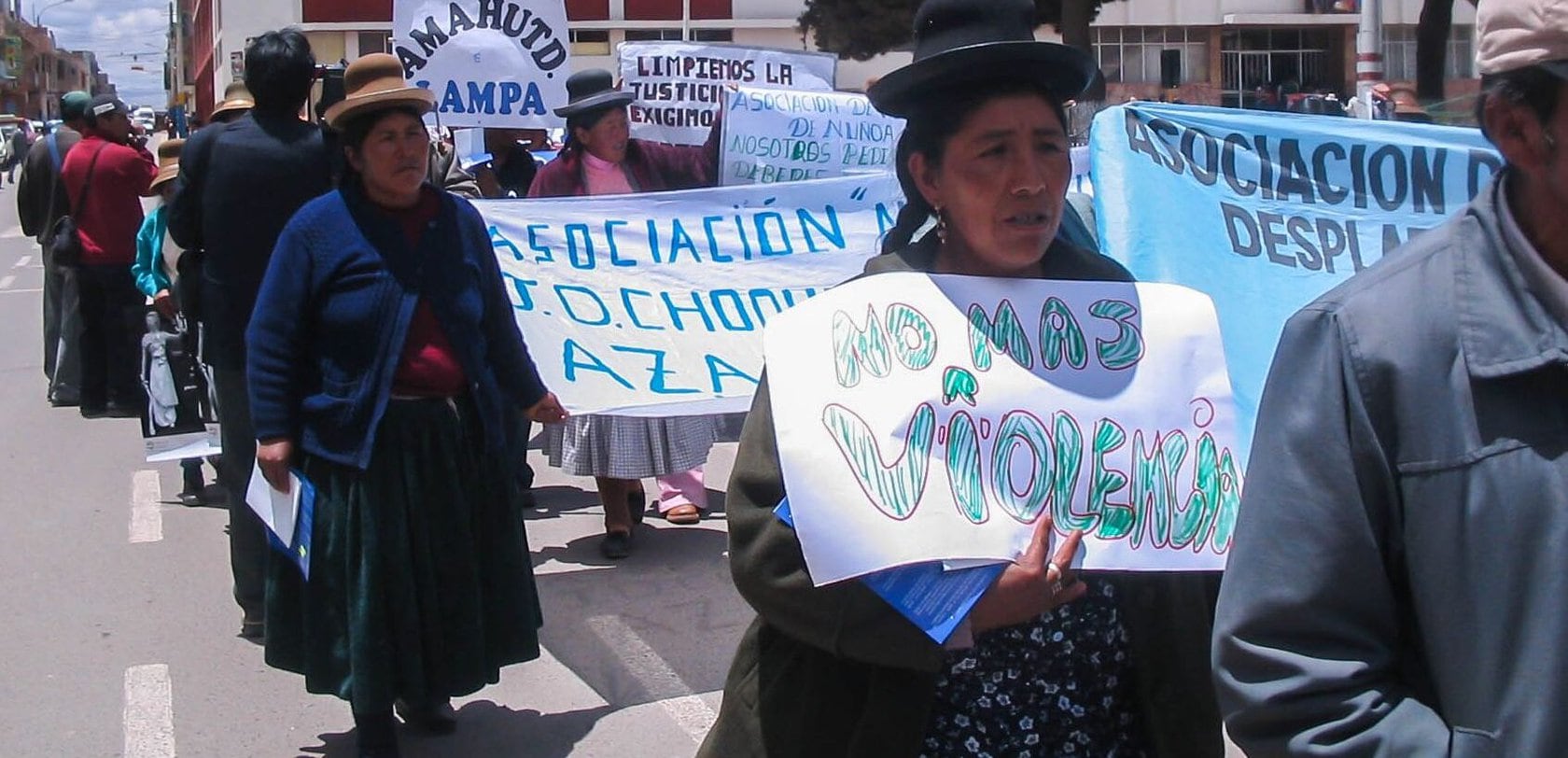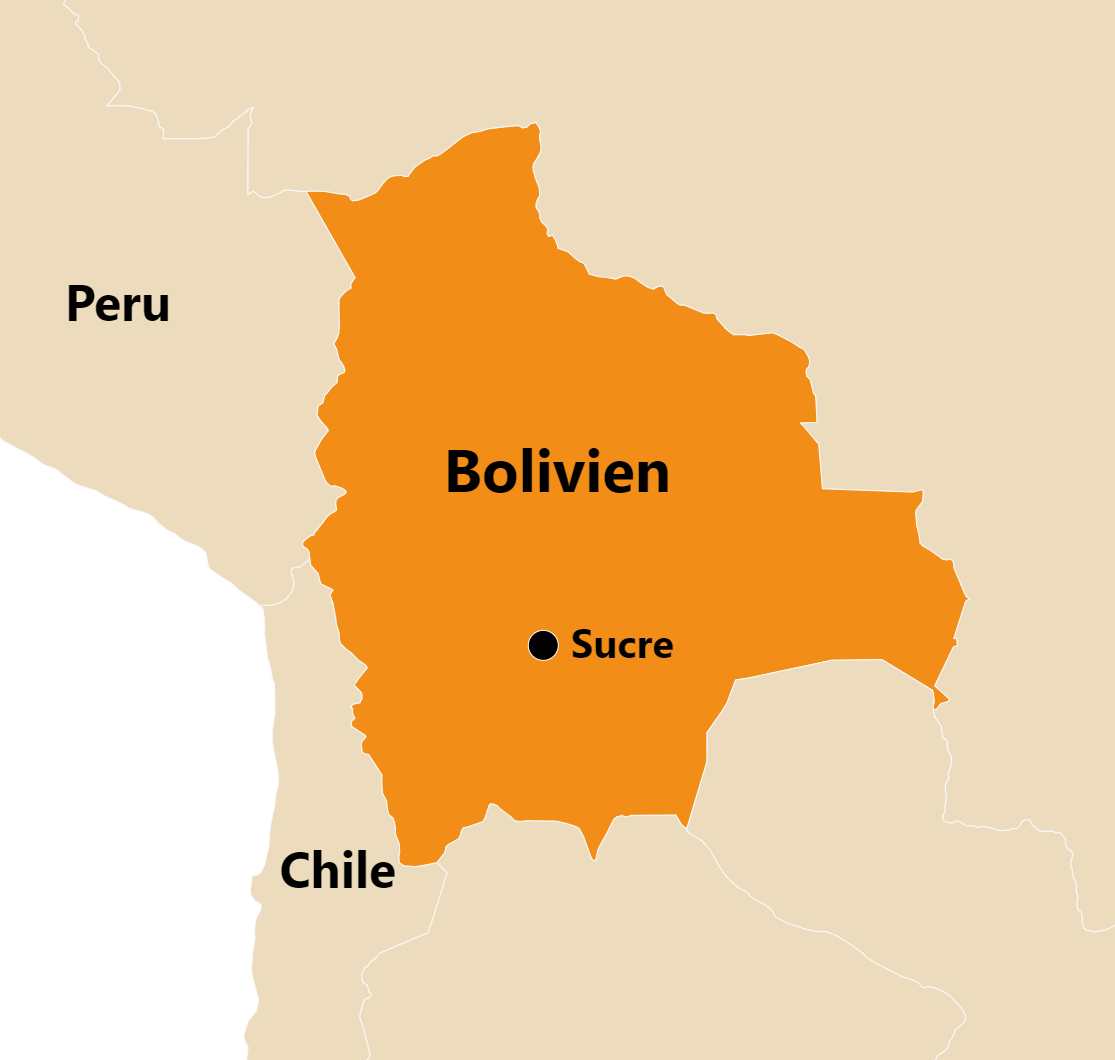
Jannet Villanueva
Coordinator Latin America (Bolivia and Peru)

Project Number: 400.1021
Our partners are active in prevention work as well as in accompanying victims of sexual and domestic violence. They are particularly committed to the protection of victims of domestic, sexualized and gender-based violence, but also to the protection of environmental and human rights activists who are persecuted for politically motivated reasons. (Sexual) violence is a socially tolerated and structural problem in all Latin American countries and their fragile ones, which has reached epidemic proportions. With their work on "Overcoming Violence - Promoting Self-Determination", our partners make an important contribution to the right to live in physical and psychological integrity. In doing so, they support the achievement of Goals 5 and 16 of the UN Agenda for Sustainable Development. Goal 5 focuses on gender justice, Goal 16 on peace and justice.
Domestic violence in Latin America not infrequently culminates in femicide, which is the most radical form of gender-based violence. However, domestic violence can also lead to sexual violence.
Peru registered 137 femicides and over 5,380 disappearances of women and girls in 2022. Also registered were 8,100 cases of sexual violence against minors. In Bolivia, 94 femicides, 38 infanticides and 51,911 reports of sexual violence were registered. In Chile, femicides remained constant with 53 cases, compared to the previous year. While reports of sexual violence have increased exponentially.
Despite the publication of these figures, the problem is difficult to express statistically. Reports often do not result in punishment for perpetrators, which further fuels the problem. Sexual assaults are still too often not reported because the victims are at a disadvantage compared to the perpetrators or are economically and/or emotionally dependent on them. Many perpetrators are close relatives of the victims and/or employees of special education schools/centers, which means that the real number of victims of sexual violence is probably much higher than statistically recorded. Since not only women, but also children and young people in Latin America are disproportionately exposed to domestic and sexual violence, many of our partners also carry out awareness-raising work in public schools and strengthen the self-confidence of children and young people.
The opportunities for civil society to participate politically have increased in Latin America in recent years. Environmental, human rights and women's organizations closely monitor government policies and engage in active public relations and lobbying. But it is precisely this involvement that carries great risks for the activists. Many of them are exposed to repression, persecution and attacks. Nevertheless, they engage themselves for those who still have no voice and often put their lives at risk. The Casa DEI of our project partner in Costa Rica, offers a concrete contact point in emergency situations.
Bolivia
Chile
Costa Rica
Peru
Peru
Bolivia
Chile
Costa Rica
Peru:
FLORA TRISTAN
26 women from rural communities were trained as multipliers in the areas of prevention against gender-based and sexual violence and agroecological production methods. In addition, 60 local officials were sensitized on the topic of gender-based and sexual violence. Thanks to strong lobbying, the municipality of Oropesa was convinced to establish a public office to officially address gender-based and sexual violence. Flora Tristan has also provided legal and psychosocial support to numerous victims of violence.
EMAUS
All 260 students surveyed said they had experienced an improvement in their everyday family life. For example: Conflicts are no longer taboo, but are expressed through techniques such as listening, introspection, non-violent verbal and non-verbal communication. This creates a climate of trust and helps to resolve conflicts peacefully and reduce emotional tensions in the family. This was also reflected in peer relationships and has led to improved teamwork at school and better performance overall.
ISAIAS
19 women (60%) who participated in the project reported improvements in their daily family life, especially positive changes in their partners' behavior (more participation in household, more appreciation and support). 27 women also completed their short training as drivers, plumbers and PC/mobile phone repairers. Half of them have already been able to find customers and generate a small income (project ends at the end of 2022).
Bolivia:
MACHAQA AMAWTA
More than 1000 school children, their teachers and parents were sensitized on the topic of gender-based and sexual violence. Over 90 state employees who deal with victims of violence on a professional basis were also trained. The spiral of violence was interrupted in 17 of the 27 victims of violence who received support. Another 10 children and their parents continue to be accompanied and cared for. Machaqa Amawta has also carried out a national awareness campaign, with presence on the radio, on TV and with the production of a video with the participation of a well-known Bolivian singer.
Chile:
SEDEC
The spiral of violence was interrupted in 20 of the 27 victims of gender-based and sexual violence who received support. In addition, 10 family counsellors were trained, who are able to uncover violence in families, talk to the victims about it and find solutions together with them. At the local and regional level, numerous campaigns for the prevention of gender-based violence were carried out together with other authorities and reached a large target audience.
Costa Rica:
DEI
All 15 people who received room and board at Casa DIE reported an improvement in their living conditions, especially in the areas of psychological and physical stability and general safety. These are women human rights defenders threatened by violence from Colombia, Guatemala, Nicaragua and Costa Rica. Furthermore, Casa DEI gave shelter to 15 indigenous people so that they can advocate for their territories or the concerns of their communities from the capital. Also, 14 staff members of other organizations were trained to work with migrants and human rights activists and to work against gender-based and other forms of violence.

401 murdered activists in Latin America (2022)
137 femicides, 22,456 cases of sexual violence, 5380 girls and women disappeared, 8100 cases of sexual violence against minors (2022).
94 femicides, 38 infanticides, 51,911 reports of sexual violence (2022).
53 femicides, 39,933 reports of sexual violence (2022).
Project budget 2024
CHF 186'300
Mission 21
Protestant Mission Basel
PO Box 270
Missionsstrasse 21
4009 Basel, Switzerland
Tel.: +41 (0)61 260 21 20
info@mission-21.org
Donation account Switzerland:
IBAN: CH58 0900 0000 4072 6233 2
Tax exemption number:
CHE-105.706.527
Donation account Germany:
Savings Bank Lörrach-Rheinfelden
Swift BIC: SKLODE66
BLZ: 683 500 48
IBAN: DE39 6835 0048 0001 0323 33
Account No. : 1032333